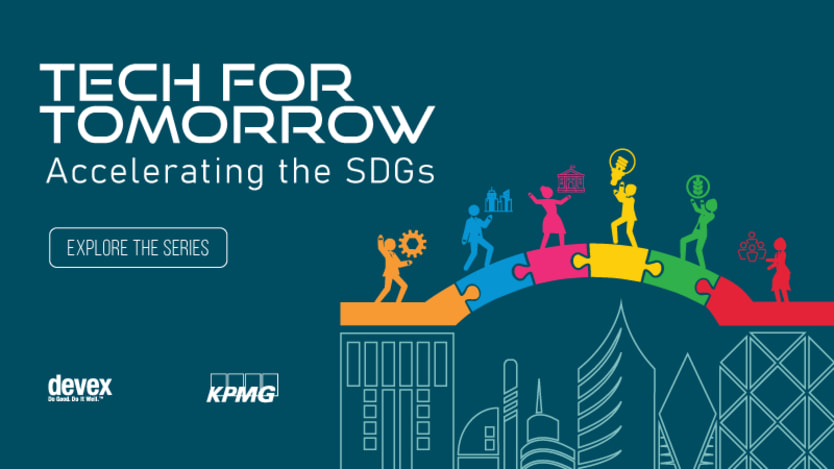
The COVID-19 pandemic has exacerbated the challenges of achieving the Sustainable Development Goals by 2030. It has not only impacted people’s health and well-being but also livelihoods and jobs. This translated into a massive loss of an estimated $3.5 trillion in labor income for the world’s workers in the first three quarters of 2020, as the pandemic abruptly decreased their work hours.
Even though no one was exempt from the pandemic’s effects, the economic and social crisis has further increased inequalities. Women, migrants, and young and low-skilled workers were the most affected, as they were mostly in low-paid, temporary work or in jobs that could not be done remotely.
On the other hand, the pandemic also accelerated the profound transformation that has been shaping the future of work worldwide. Two major drivers behind such an unprecedented shift are digital technologies and climate change.
The rapid implementation of digital technologies in the past two decades has transformed how people work. Such technology will continue to evolve, resulting in an increased need for digital skills and human-machine collaboration. As a result, the labor market will likely demand higher tech skills.
The automation of the workforce, driven by emerging technologies such as artificial intelligence and robotics, is likely to both disrupt and create millions of jobs in the coming years.
Some 74% of the 1,325 business leaders who took part in the KPMG 2021 CEO Outlook Survey noted they had accelerated the digitization of their operations. They also indicated that they recognized that the future of work means focusing on upskilling and adopting emerging technologies. Yet, as the Organization for Economic Co-operation Development Employment Outlook 2019 found, many adults do not have the right skills for emerging jobs, and the digital divide is persistent. Six out of 10 adults lack basic IT skills or have no computer experience, for example.
New challenges and opportunities
While the potential benefits of adopting digital technologies can contribute to economic growth and outpace job losses, the challenges and benefits of digitalization will likely vary across regions. Let’s take Africa, the continent with the world’s youngest population and the majority of employment in the informal sector, as an example.
Contrary to high-income countries, where automation in sectors such as manufacturing poses risks of some job losses, as the World Development Report 2019 highlighted: “Sub-Saharan African countries have the potential to create new jobs from technology adoption across all sectors and skill categories.” While adopting digital technologies can increase workers’ productivity, manufacturing sectors remain small and largely unautomated in the region.
According to OECD, 14% of jobs are at high risk of becoming automated, particularly in routine or low-skilled tasks. However, despite the technological advances in the last decades, most countries and territories have increased jobs at an average rate of 12% from 2012-2019, indicating a positive relationship between technology and productivity. It is also important to highlight that the highest growth rate has been observed in the information and communications technology sector, where the growth rate was greater than 51% and is expected to keep growing. Consequently, countries and territories should consider the future of work as a digitally driven future.
Climate change shaping the future of work
Transition to and investments in clean energy — which is key to achieving the net-zero emissions goal — could create an estimated 14 million new jobs by 2030. The International Energy Agency estimates that 16 million more workers will be needed to meet the increasing demand for more efficient appliances, electric and fuel cell vehicles, building retrofits, and energy-efficient construction.
However, these opportunities will likely not appear in places where approximately 5 million jobs will be lost due to the decline in the use of fossil fuels. Therefore, it is critical to develop and implement “just transition” policies that encompass skills development — including upskilling and reskilling, social protection, and labor and employment policies to mitigate the challenges arising from the net-zero transition for communities, individuals, and businesses.
For now, actions taken by governments to develop green skills and promote green jobs are still limited, even though green skills will eventually be crucial to adapting processes, products, and services to the regulations and requirements needed to reduce climate change. An OECD questionnaire showed that only 60% of countries and territories had taken at least one action to grow the green market, and most have only introduced training programs.
Meanwhile, subsidies for the private sector or the direct creation of green jobs in the public sector are still rare. The lack of economic support to incentivize companies to invest in green skills might become a barrier to achieving the net-zero transition.
A recent KPMG survey of business leaders from 1,095 leading global companies also demonstrates that the transition to net-zero requires businesses to factor in “human capital.” While 74% believe they have the necessary climate knowledge, expertise, resources, and skills to deliver on their decarbonization plans, almost half expect high levels of employee resistance in implementing them, and 34% expect some negative impact from employees believing they would be retrained and upskilled.
Despite the awareness and investment of big firms around green jobs and skills, few small- and medium-sized enterprises are aware of the significant role these skills will play in the emerging green economy, which could translate into further disparities between large and smaller companies.
Equitable and greener work
Implementing adaptive skills and employment policies, creating social protection systems with a solid commitment to equality, and improving digital infrastructure and connectivity across low- and middle-income countries would help expand the benefits of respective economic activities.
Firstly, according to the latest OECD Jobs Strategy, it is crucial to shift work and labor market policies from remedial to preventive. This shift can boost efficiency and equity at the same time. Preventive policies require governments to collaborate with industry to research and predict the market’s future needs and then tailor education to provide society with the skills employers need.
This would help to bridge the existing skills gap between the worlds of education and the workplace. The OECD report Skills Matter projected that aligning education and training programs with labor market demands can influence the economy at both the micro and macro levels. On a micro level, it influences individuals’ job satisfaction and wages, while on a macro level, it reduces unemployment and boosts economic development.
Automation and artificial intelligence offer new opportunities that can drive greener and more efficient processes. But technology can also aggravate disparities between high-skilled and low-skilled workers. Therefore, policies should focus less on the risks of job loss but rather on a future with different jobs that will require the reskilling and upskilling of society.
In particular, promoting better and more diverse representation in the technology field is essential to reducing embedded economic and social disparities. Better representation requires people from diverse backgrounds, particularly disadvantaged communities, to collaborate in designing and implementing innovative technologies.
At the same time, policies that target the development of green skills are also required. There is already a shortage of green skills in specific sectors in some countries and territories. Policies that lead to green education and training programs are necessary to help workers participate fully in the emerging green economy. Additionally, governments could promote green jobs through tax policies to ensure that cost pressures generated by environmental policies do not become an obstacle to employment.
Finally, putting the needs of affected communities and individuals — either as employees or business owners — at the center of net-zero emissions efforts would not only contribute to the positive recognition of such efforts by the public and employees but also help diminish disruptions due to job losses or the reduction of economic activities in areas reliant on fossil fuels.
What does this imply for the future of work? Digital technologies and climate change are unavoidable factors driving the transformation of work and the labor market, and the demand for digital and green skills is rapidly increasing. Stakeholders in both the private and public sectors need to work together to predict demands that enable them to tailor training and education to satisfy employers’ needs — and to do so in a way that considers people from diverse backgrounds and experiences.
Visit the Tech for Tomorrow series for more coverage on how technology plays a key role in delivering solutions to a broad number of global development challenges. The time to bridge the gap is now. Join the conversation by using the hashtag #TechForTomorrow.










